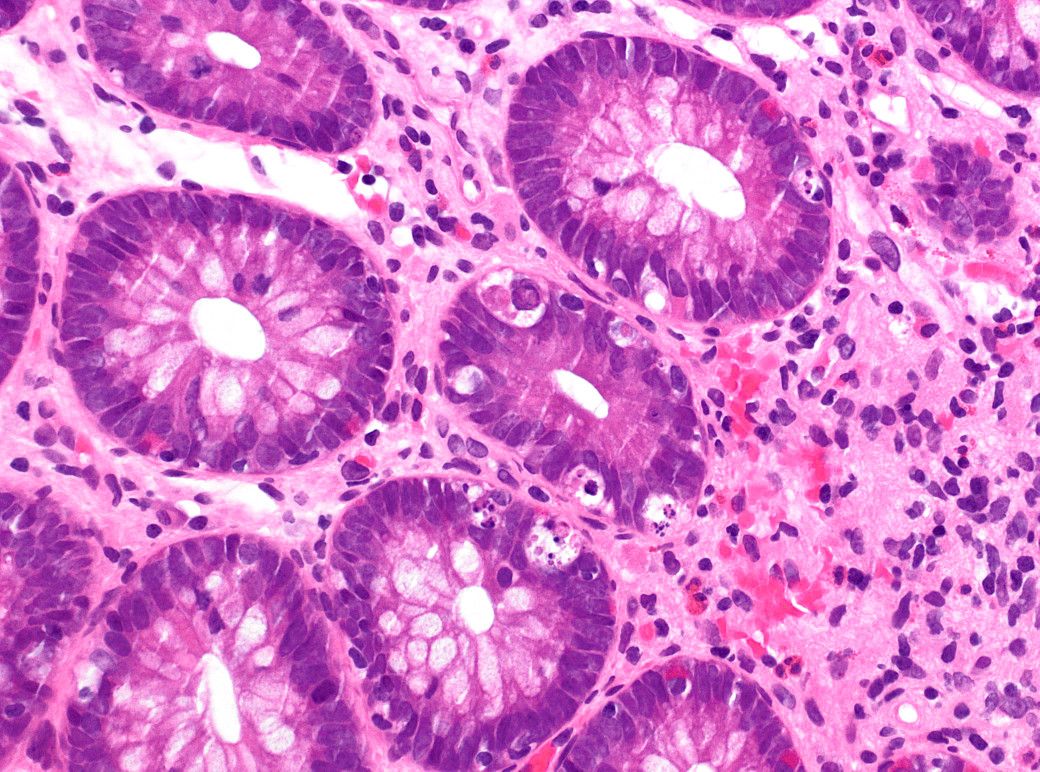MaaT013 Elicits Durable Responses in Acute Graft-vs-Host Disease
Efficacy findings reveal that the phase 3 ARES study evaluating MaaT013 met its primary end point of gastrointestinal overall response rate.
Efficacy findings reveal that the phase 3 ARES study evaluating MaaT013 met its primary end point of gastrointestinal overall response rate.

Maat013, a microbiome ecosystem therapy, elicited durable responses as a third-line treatment for patients with acute graft-versus-host disease with gastrointestinal involvement (GI-aGvHD), according to a news release from the drug’s developer, MaaT Pharma.1
Notably, the primary end point of the phase 3 ARES study (NCT04769895), which evaluated the therapy as a third-line treatment for GI-aGvHD, was met, with a significant GI overall response rate (GI-ORR) at 28 days of 62% as assessed by the independent review committee (IRC), significantly exceeding the expected 38% response rate (P <.0001). Additionally, 38% of the patient population achieved a complete response (CR) and 20% attained a very good partial response (VGPR).
ORR in all evaluable organs occurred in 42 (64%) patients, with similarly high CR (36%) and VGPR (18%) rates. Furthermore, the estimated 12-month overall survival (OS) rate was 54% for this patient population, with median OS not yet reached and 12-month estimated rate at day 28 among responders was 67% vs 28% among non-responders (P <.0001).
“Gastrointestinal involvement in aGvHD is a devastating condition, particularly for patients who do not respond to ruxolitinib [Jakafi]. These individuals face an urgent unmet medical need, with alarmingly low survival rates and a critical lack of effective treatment options,” Mohamad Mohty, MD, PhD, professor of Hematology and head of the Hematology and Cellular Therapy Department at Saint-Antoine Hospital and Sorbonne University in Paris, France, said in the news release.1 “The results for MaaT013 in this phase 3 trial represent a groundbreaking advancement in third-line treatment for GI-aGvHD. By directly targeting the gut-immune interface, this innovative therapy has the potential to redefine disease management, bringing new hope to patients and clinicians, alike.”
Patients enrolled were pretreated with 250 mg oral vancomycin 4 times a day during days 0 and 1 of the study period and received the first dose of MaaT013 on the second day.2
Patients received a second of 4 doses between days 3 and 5 of the study period. Subsequent doses were administered between 5 and 9 days after the previous dose, up to 4 doses, with a supplementary dose allowed in the event of GvHD relapse or massive antibiotic use during the study period.
Patients in the study were majority males (53%), had a median age 55.5 years (range, 24-76) and were grade IV (33.3%), III (57.6%), or II (9.1%) aGVHD at baseline according to both IRC and investigator assessments. Additionally, 86.4% of patients were steroid-refractory and all patients on the study were ruxolitinib refractory.
The primary end point of the study was GI-ORR at 28 days. Secondary end points included safety and tolerability, aGvHD ORR, best response rates for both GI-aGvHD and aGvHD in all evaluable tumors, progression-free survival, OS, and duration of response.
The independent Data Safety Monitoring Board (DSMB) previously concluded that no safety concerns were identified from 30 patients reviewed during an interim safety analysis of the phase 3 trial.3 Additionally, they reported that MaaT013 was well-tolerated with an adverse event profile consistent with its previous safety profile. Furthermore, no increased infectious risk or fatal events attributable to MaaT013 were reported by the DSMB.
References
- MaaT Pharma announces positive topline results from the pivotal phase 3 ARES study evaluating MaaT013 in acute graft-versus-host disease. News release. MaaT Pharma. January 8, 2025. Accessed January 9, 2025. https://tinyurl.com/ymc23ny4
- MaaT013 as salvage therapy in ruxolitinib refractory GI-aGVHD Patients (ARES). ClinicalTrials.gov. Updated October 17, 2024. Accessed January 9, 2025. https://tinyurl.com/55afnkhy
- MaaT Pharma announces positive outcome following DSMB review reinforcing confidence in phase 3 on-going trial in acute graft-versus-host disease with MaaT013. October 26, 2023. Accessed January 9, 2025. https://tinyurl.com/mpvyjwvj
Navigating AE Management for Cellular Therapy Across Hematologic Cancers
A panel of clinical pharmacists discussed strategies for mitigating toxicities across different multiple myeloma, lymphoma, and leukemia populations.